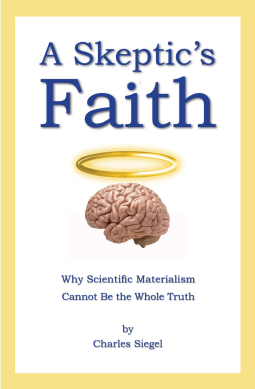
A Skeptic’s Faith
Why Scientific Materialism Cannot Be the Whole Truth
by Charles Siegel
This title was previously available on NetGalley and is now archived.
Send NetGalley books directly to your Kindle or Kindle app
1
To read on a Kindle or Kindle app, please add kindle@netgalley.com as an approved email address to receive files in your Amazon account. Click here for step-by-step instructions.
2
Also find your Kindle email address within your Amazon account, and enter it here.
Pub Date 8 Mar 2023 | Archive Date 15 Jul 2023
Talking about this book? Use #SkepticsFaith #NetGalley. More hashtag tips!
Description
Warning: This Book May Change Your Worldview
Whether you are a materialist or follow a conventional religion, this book will make you think hard about your beliefs. If you are uncertain, this book will help you think more clearly about science and religion.This book looks critically at materialism, the belief that only matter exists and mind or spirit is a byproduct of matter. It shows that what philosophers call “dualism,” the belief that matter and spirit exist independently, is more plausible than materialism.
It begins by reviewing the arguments that philosophers have used to show that computers cannot have consciousness.
Then it shows that materialism cannot provide a basis for scientific knowledge or morality - and shows that it is self-contradictory to claim that science has proven that only matter exists.
It examines both the evidence from near-death experiences and the attempts to explain away this evidence.
It concludes by asking how we can reconcile religion with science, looking at a wide range of religions.
From the beginning, the book takes a skeptical, critical approach to both materialism and religious faith:
“As a congenital skeptic, I cannot believe something unless I have some reason to think that it is true. Yet I find that preachers of materialism can be just as dogmatic as preachers of religion.
“For example, Steven Pinker claims that a computer that modeled the human brain would have consciousness like ours because the idea that computers can have minds is ‘as fundamental to cognitive science as the cell doctrine is to biology and plate tectonics is to geology’ - which is like saying you believe God created the universe because it is fundamental to your religion.
“Pinker thinks he is being scientific, but science is based on evidence. There is plenty of evidence for cell doctrine and plate tectonics, but no evidence at all that computers can have consciousness.”
This book rejects both materialist dogmas and religious dogmas. Instead, it follows the evidence to see how far it can lead us.
Available Editions
| EDITION | Paperback |
| ISBN | 9781941667446 |
| PRICE | US$12.95 (USD) |
| PAGES | 162 |
Available on NetGalley
Average rating from 34 members
Featured Reviews
In the first chapter already, I saw a kindred soul. Someone admits that they too are and have always been unable to believe something unless they have some reason to believe that is true. This is exactly the point why I feel like every and any religion has failed me - or I have failed them - just because I have always been so utterly unable to believe.
So, the first chapter already made me kind of biased and made me like the book and the author already. So, I kept on reading being sure I already like, love, and enjoy this book.
As I kept reading, I had to look up the author and their background, because their way of thinking and writing was so much like mine, and like several of those I went to the university with - I saw a reflection of my university education there, a university degree in philosophy. That approach, that way with words. That screams of a background in philosophy. But. This is so weird - I was unable to find anything, absolutely anything about him.
Either way, this book was such a delight to read. It was written in a language I understand and speak fluently - a language of an open mind, science, logic, and reason. And skepticism too, of course.
If anyone out there is desperately looking for a reason-infused read regarding all sorts of real-life issues (with a very healthy dose of philosophy added to it), this is something I cannot recommend this book enough.
P.s.
Although I used to be the biggest fan of Richard Dawkins some 15 years ago, and this book goes on about him not being the bearer of the ultimate logic and truth after all in everything and anything he says, I absolutely see the validity of their point, and I do not feel in any way threatened to keep being a Dawkins' fangirl in my own way. So, even if the book contains some opinions that are in a way contradictory to your own ones, they are written in such a way that you can see the logic in their thinking, yet it does not make you feel any less than just because you choose to stick to your guns with your opinion.
‘A Skeptic’s Faith’ by Charles Siegel was, for me, an extremely thought provoking, open minded, wildly intriguing read. Definitely will be reading again. Recommend!
 Andrea R, Reviewer
Andrea R, Reviewer
A Skeptic's Faith is a deep philosophical book that speaks about faith, science and how the common concept of scientific materialism puts everything into question. Using many examples from scientists and people calling themselves philosophers attempting to expose philosophical ideas based on scientific materialism, really gets one thinking if what is so-called mainstream thinking in the sciences really makes sense.
Thank you Netgalley and Omo Publishing for this advanced reader copy. A Skeptic’s Faith offers another way to look at most influential items if this works. Early in the book materialistic thinking is discussed. Which offers a different way to examine life and theories. The book is interesting, read it with an open mind.
Readers who liked this book also liked:
We Are Bookish
Biographies & Memoirs, Health, Mind & Body, Nonfiction (Adult)
We Are Bookish
General Fiction (Adult), New Adult, Romance
Kalan Chapman Lloyd
General Fiction (Adult), Literary Fiction, Women's Fiction


















